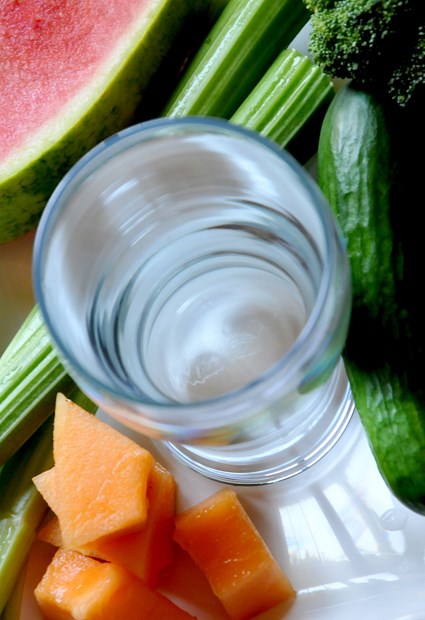Water is your body's principal chemical component and makes up approximately 60 per cent of your body weight.
Every system in your body depends on water. Water regulates body temperatures, eliminates toxins, carries nutrients and oxygen to the cells, and provides a moist environment for body tissues and joints.
In this article, I'll share some tips on how to stay hydrated, energetic and headache-free this summer, along with a list of the top five hydrating foods.
An appropriate water and electrolyte balance are critical for the function of all body systems. Ensuring your electrolytes are balanced means that you need more than just water to stay hydrated this summer.
So what are electrolytes? Electrolytes are vital minerals that are electrically charged (sodium, calcium, potassium, chlorine, phosphate and magnesium), and play a role in muscle contraction and various other physiological processes.
Twenty per cent of your hydration could come from fruits and vegetables, according to the Institute of Medicine.
Staying hydrated is of top importance especially during hotter months. If you are exercising in the heat, dehydration can cause blood volume to drop, which lowers the body's ability to transfer heat (sweat) and forces your heart to beat faster, making it difficult for the body to meet aerobic demands. You can also experience fatigue, headaches and constipation from being dehydrated.
During exercise, especially in the heat, individuals can sweat as much as 1.5 litres of water per hour. It is very important to avoid dehydration and maintain electrolyte balance. Always try to match fluid consumption with sweat loss.
Don't wait to drink until you feel thirsty. Unfortunately, thirst is usually perceived too late. You may not feel thirsty until you have lost approximately one to three pounds of body/water weight.
If you are concerned about fluid loss, the best way to ensure you are properly hydrated is to weigh yourself before and after exercise.
Approximately 16 ounces or a half-litre of water should be consumed for every pound lost.
We can all agree that water gets boring sometimes, however it's essential to drink eight to 10 glasses of clear, decaffeinated, non-carbonated water throughout the day to maintain proper fluid levels.
Include the following top five hydrating fruits and vegetables into your day to stay well-hydrated and also to provide your body with essential minerals, natural sugars, amino acids and vitamins that are all lost when you sweat.
Watermelon
Watermelon contains 92 per cent water, eight per cent natural sugar, and essential electrolytes such as calcium, magnesium, potassium and sodium. Watermelon is rich in Vitamin C, beta-carotene and lycopene that will give the body protection from UV light.
Cucumbers
Cucumbers have 96 per cent water content and a good balance of electrolytes, such as, calcium, magnesium, potassium and sodium. The mineral silica, also found in cucumber, is essential for healthy, lubricated connective tissue, which includes muscles, tendons, ligaments, cartilage and bone.
Celery
Celery is considered to be a powerful electrolyte food. As little as two to three mineral-rich stalks of celery can replenish an athlete's sodium, potassium, magnesium, calcium, phosphorus, iron and zinc levels after intense exercise.
Broccoli
Broccoli is part of the cruciferous vegetable family. It contains 90 per cent water and many health-supporting compounds such as antiinflammatory antioxidants, which protects DNA, anticancer nutrients and those that help to detoxify the vast number of potential toxins that we encounter each day.
Cantaloupe
Potassium is important for muscle contraction and the rhythm of the heart. The majority of potassium in the body is stored within the cells, so small changes in the concentration of potassium in the bloodstream can have serious health consequences.
Cantaloupe, a potassium-rich fruit, provides 29 calories per serving and is made up of 89 per cent water. Cantaloupe is an exceptionally good fruit for supporting energy production through its efficient carbohydrate metabolism and ability to keep the blood sugar stable.
The following is one last hydration tip: Drink water through a straw.
There's no scientific research to back this theory up but it's much easier to consume water when you drink it this way. Add different herbs and vegetables like mint, cucumber and lemons to your water to boost the flavour.
Cheryl Wahl, RHN, CPCC, is the founder of North Shore Nutrition and the creator of the Cancer Prehab 101 program. cancerprehab101.com



